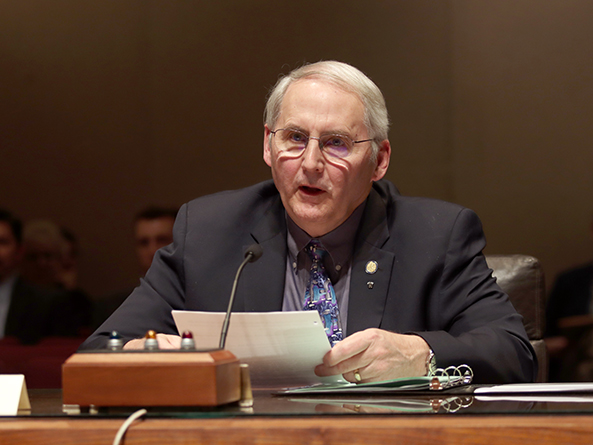Bill would require state approval for all directed health measures
The Health and Human Services Committee heard testimony March 2 on a bill that would require local public health departments to receive state approval before implementing directed health measures.

Under current law, DHMs — such as indoor mask mandates — can be implemented without the approval of the state Department of Health and Human Services only by a local health district organized as city-county health department and located in a county with a population greater than 200,000. The Lincoln-Lancaster County Health Department is the only entity that fits that definition.
LB859, sponsored by Elmwood Sen. Robert Clements, would remove that provision of state law and instead would require all local public health departments to receive prior approval from DHHS.
Clements said the Lincoln-Lancaster County Health Department exception caused division among local communities during the pandemic and concern that “overreaching DHMs” encroached on residents’ personal liberties and created an unlevel playing field for businesses depending on their location.
“It’s become clear to me that during a pandemic of an airborne virus it would be best dealt with on the statewide level when considering DHMs,” he said.
The bill also would require the board of health of all local health districts to hold a public hearing — with 10 days prior notice — before enacting rules and regulations.
Dale Michaels, a retired family physician, testified in support of the proposal. Having different directed health measures during the pandemic was confusing and unnecessary, he said.
“Given the fact that Nebraskans are largely the same wherever they live, it just doesn’t make sense,” Michaels said.
Gary Anthone, chief medical officer and director of public health at the state Department of Health and Human Services, also supported the bill. Viruses and other infectious diseases do not recognize county lines, he said, and Nebraska would benefit from a uniform, statewide approach.
“The bill would provide more continuity and consistency to directed health measures across the state in response to a pandemic or epidemic,” Anthone said.
Pat Lopez, director of the Lincoln-Lancaster County Health Department, opposed LB859. It is critical that local officials have authority to address public health threats, she said, adding that an additional 230 residents would have died if Lancaster County had had the same COVID-19 death rate as the rest of Nebraska.
The department relied on evidence-based practices from local and national public health agencies to try and protect the county’s hospital system, reduce illness and death and lessen the pandemic’s impact on education, government operations and businesses, she said.
“There will always be new and emerging infectious disease threats,” Lopez said. “Having the ability to address them locally and rapidly — to implement protective measures based on local conditions — is critical to protecting the public’s health for Lincoln and Lancaster County.”
Testifying on behalf of the Lancaster County Board of Commissioners, Commissioner Rick Vest also spoke in opposition to the bill. The Lincoln-Lancaster County Health Department “admirably executed its mission and saved lives,” he said, adding that different counties have different needs during a public health emergency and local officials are best positioned to know what those needs are.
“LB859 mistakenly treats the Lincoln-Lancaster County Health Department as an exception that needs to be corrected, whereas the results show that our health department is a model to be emulated,” Vest said.
The committee took no immediate action on the bill.


